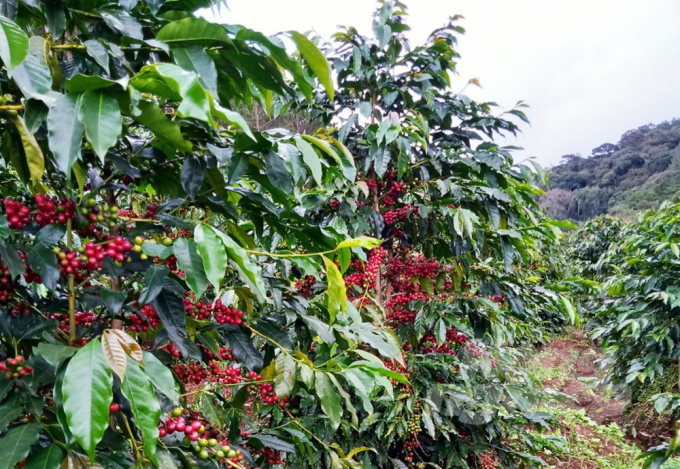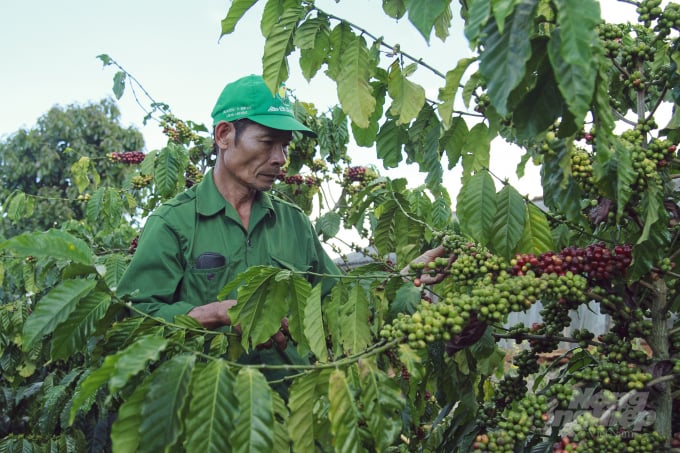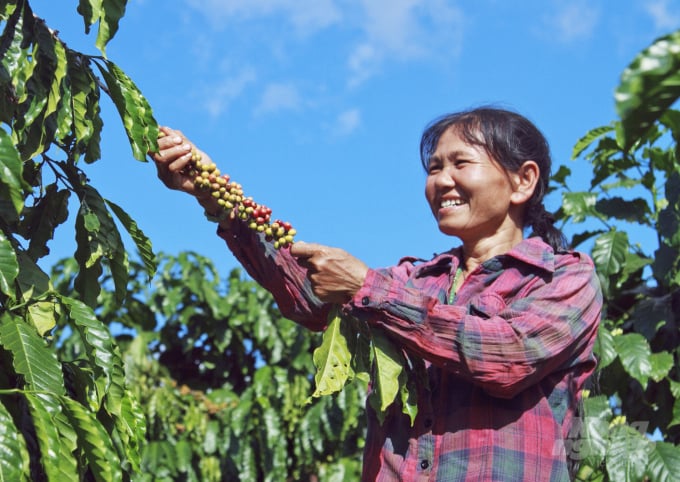November 26, 2025 | 11:55 GMT +7
November 26, 2025 | 11:55 GMT +7
Hotline: 0913.378.918
November 26, 2025 | 11:55 GMT +7
Hotline: 0913.378.918
Coffee farms in the Central Province of Lam Dong are struggling to find workers to harvest coffee as coffee is ready for harvesting.
For the last, Tran Van Xuat, director of Nam Ban Agriculture Co-operative in Lam Ha District, the Central Province of Lam Dong was unable to find workers to harvest coffee while his coffee is ready for harvesting in about two weeks.
“Because of the COVID-19 pandemic, this year, it is difficult for me to hire coffee harvesting workers,” he said.
Xuat said that they offered VND 300,000 – VND 350,000 for a worker to harvest coffee in a day but there was no workers to hire.
“Coffee is ripened. It’s rainy season in the Central Highland region now. Without being harvested timely, the coffee will be damaged,” Xuat worriedly said.

It's peak time to harvest coffee in the Central Highland of Lam Dong. Photo: Minh Hau.
According to Lam Dong Province’s Agriculture and Rural Development, about 173,660 ha of coffee in the province was entering harvesting time. With average productivity of 3.2 tonnes per ha, about 2.3 million tonnes of fresh coffee need harvesting.
On average a worker can collect 320 kg of fresh Robusta coffee per day and 1 hectare of the coffee requires 44 workers to harvest.
A worker can collect 180kg of fresh Arabica coffee per day and 98 workers are needed to harvest a hectare of the coffee on average.
It is estimated that nearly 8 million working days were needed to harvest the coffee this coffee season.
Coffee harvesting time in Lam Dong Province usually lasts three last months of a year. Now, local workers could deal with 45-50 per cent of harvesting work. It’s necessary to hire people from other localities.
In previous years, migrant workers flocked to the province during coffee harvesting time. However, now, due to the COVID-19 pandemic, it’s difficult to attract migrant workers.

Lam Dong province is now facing a shortage of labour for coffee harvesting. Photo: N.Nga.
To ensure labour for coffee harvest and the COVID-19 prevention and control, Lam Dong Province’s Department of Agriculture and Rural Development has implemented many solutions. In particular, the agency suggested localities with large coffee production areas such as Di Linh, Bao Lam, Lam Ha, Duc Trong, Dam Rong, Lac Duong, Da Lat and Bao Loc districts to review and forecast coffee output to be harvested, required labour resources. Agencies, organisations and businesses are called on to support coffee farms in harvesting, producing and trading.
Nguyen Van Chau, Deputy Director of Lam Dong Province’s Department of Agriculture and Rural Development said that the local department asked the local labour department to guide employment centres to introduce labourers for coffee harvesting.
The department also proposed the Provincial Women's Union, the Provincial Farmers' Union and the Provincial Youth Union to co-ordinate and arrange their members to support farmers in harvesting coffee.
In addition, the provincial Sub-Department of Cultivation and Plant Protection was required to work with locals Agricultural Extension Centers, the Sub-Department for Quality Management of Agro-Forestry and Fishery Products to regularly follow the farming plans so that they could timely consult and guide farmers in investment for the next crops.

A worker can receive about VND 300,000 -350,000 to harvest coffee in a day. However, coffee farms still find hard to get workers.Photo: N.Nga.
At the same time, farmers are supported to harvest and preserve coffee properly. The locality also promoted the development of coffee production, purchasing and processing chains to help farmers consume products.
Chau added that the agricultural agency also assigned staff to monitor the production and harvesting in every area to detect difficulties and problems and then, offer timely supports for farmers.
Translated by Hien Anh
/2025/11/26/3627-4-082628_818.jpg)
(VAN) From a small café on the red basalt highlands, Le Van Hoang started a business with clean coffee, building Enjoi Coffee into a symbol of organic agriculture in the Lam Dong plateau.
/2025/11/25/0045-1-135246_13.jpg)
(VAN) Ca Mau is researching a model of sea-encroaching embankments combined with viaducts and logistics service zones, aiming both to prevent erosion and create land funds for marine economic development.

(VAN) The information was shared at the seminar 'Urban Agriculture - Solutions for Developing Green Spaces,' organized by the Kinh te & Do thi Newspaper and the Biotechnology Center of Ho Chi Minh City.
/2025/11/19/4141-2-132831_216.jpg)
(VAN) One of Japfa's outstanding solutions is implementing digital transformation and artificial intelligence (AI) to optimize operations, enhance productivity, and advance sustainable development.
/2025/11/19/4847-1-093540_448.jpg)
(VAN) The Gia Lai Provincial People’s Committee had a working session with the delegation of the U.S. Department of Agriculture, the State of Idaho, and representatives of the State's leading enterprises.

(VAN) Ca Mau has a sufficient foundation to become a strong regional aquaculture center, where production integrates the economy, the environment, and the lives of the people.

(VAN) SEIKI Group envisions itself as a pioneer in the ‘dual transformation’ of digital technology and green industry, standing alongside the Government and Vietnamese businesses in their pursuit of sustainable development.